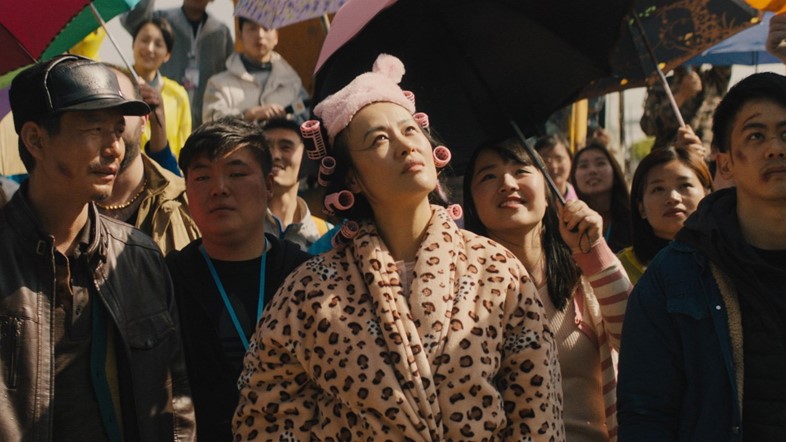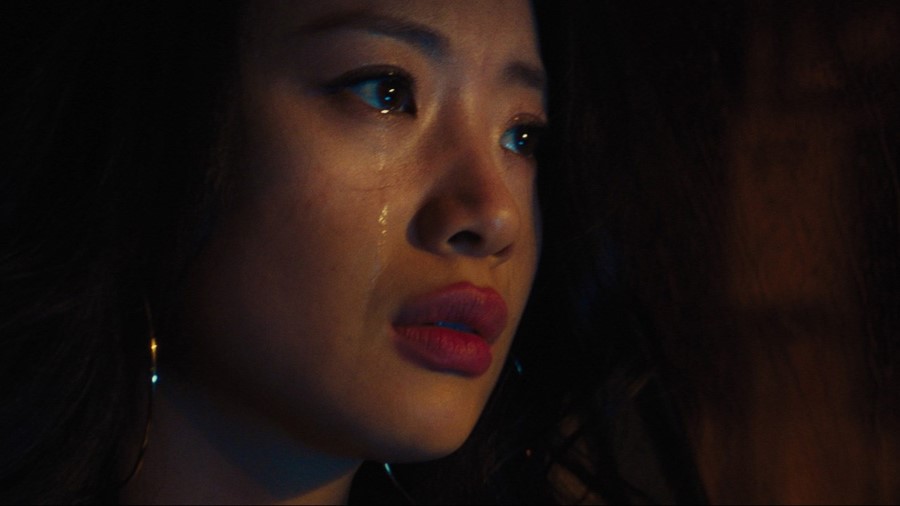As Cathy Yan’s first feature film is released on MUBI, the director speaks to Kat Haylett about making and meaning of the movie
In the spring of 2013, over 16,000 dead pigs were found floating in the Huangpu River in Shanghai. Quickly, this became a national – and then global – news story due to the bizarre nature of the incident – which was attributed to the growing reluctance of farmers to cover the rising cost of burying livestock. A few years later, this strange event served as the basis for director Cathy Yan’s first feature film, Dead Pigs (released on MUBI on 12 February). It sets the tone for a story that has many surreal and darkly humorous elements, which Yan thinks “feel real to life – that we always find humour even in the darkest moments.”
Yan is best known for helming the female-driven DC Universe film Birds of Prey, starring Margot Robbie, as well as being the first Asian woman to direct a major Hollywood superhero film. And while Dead Pigs initially premiered in 2018 at film festivals, with the success of Birds of Prey under her belt, her debut is now finding its global release. Three years after finishing the film, Yan says that Dead Pigs remains “incredibly relevant, and in many ways probably more relevant”. “When I was making it, it felt like it was about China and this specific incident in this moment in time,” she says, “but I think a lot of the themes that I saw very exaggerated and in high relief in China are now playing out around the world.”

Dead Pigs follows the interconnected narratives of five characters, many of whose conflicts stem from the pervasive class divide in China. Candy Wang refuses to sell her property to make way for a new development site, Wang Zhen goes to extremes to help pay off his father’s debts, and Xia Xia longs for human connection that she lacks with her affluent but absent father. Yan cites the director Robert Altman (Gosford Park, Short Cuts, The Player) as one of her main influences, especially his ability to create a “a thematically driven film, a tapestry of a world”. Dead Pigs manages to emulate Altman’s tendency for combining incisive political commentary with absurd comedy.
In the film Yan draws on many real-life phenomena occurring in China at the time, such as pèngcí, the practice of hurling yourself in front of an oncoming vehicle in order to extort money from the driver. However its most emotionally pivotal storyline, surrounding the character of Candy Wang, was inspired by the concept of “nail-houses” – property owners who reject the huge urbanisation movement by literally refusing to budge. Yan says that nail-houses are “a direct result of the fact that there’s no real private property in China, because of the communist government. It becomes even dicier in terms of who owns the land and what people get to do with it.” This is a subject she’s personally very familiar with, having written her thesis on it when she was at university.

While Yan observes cultural and economic trends in China from an academic and artistic standpoint, weaving them into her film, she also draws from her own experiences as a Chinese-born American. She’s fascinated by filmmakers’ debuts, seeing them as the “purest form of themselves”. Her own debut is no different – she describes it as a “very personal” film, and sees herself in many of the characters, especially the women. Yan was frustrated by the continual portrayal of Chinese women as “demure, or quiet, or noble”. “That is not the women that I know, in my family,” she says “They’re very loud and boisterous and spicy, and they’ve got tonnes of shit to say all the time.” Despite balancing multiple storylines and delving into complicated themes, Dead Pigs takes the time to make the women at its centre feel real. Yan explains that her female characters are “not perfect, or not necessarily even particularly nice, but they’re just human.”
Yan’s follow up film, Birds of Prey, received praise for its use of bright colours, an element that had long been lacking in the dreary and desaturated DC Universe. This vibrancy was already evident in Dead Pigs, with the neon lights of Shanghai illuminating many of the scenes. Yan’s debut similarly illuminates many themes common to the human experience, and she believes that “all of these characters are kind of figuring it out – some things they can control and other things they just can’t.” The sensation that we are lacking control over our circumstances has become a universally felt emotion during the ongoing pandemic, lending Dead Pigs an especially prescient quality.
Despite having huge commercial success with Birds of Prey, Yan is eager to return to her roots as a writer-director, excited at the prospect of creating her own projects again. “I am very happy to develop everything from the ground up. I think that that’s something that I want to continue to do, because that is important to me: how the story is told and what that story is.”
Dead Pigs is released on MUBI on 12 February.
